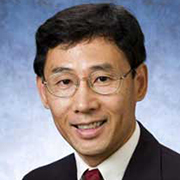A .gov website belongs to an official government organization in the United States.
A lock () or https:// means you've safely connected to the .gov website. Share sensitive information only on official, secure websites.

Urban fine particulate matter (PM) exerts adverse effects on human health, weather, and climate. An understanding of PM formation is critical in the development of efficient mitigation policies to minimize the local, regional, to global impacts. The mechanisms leading to formation of urban haze remain uncertain, and the abundance and chemical constituents of fine aerosols vary considerably, depending on complex interplay between meteorology, emissions, and atmospheric chemical processes. This talk will discuss several aspects relevant to the formation and impacts of urban aerosols, focusing on the challenges in understanding the fundamental chemical processes, including new particle formation, secondary organic aerosol, and aging of black carbon, from laboratory, field, and modeling studies.
Renyi Zhang is a Distinguished Professor at Texas A&M University, with joint appointments in the Departments of Atmospheric Science and Chemistry. He received his BS in Atmospheric Science from Nanjing University of Meteorology, his MS in Physics from The University of Nevada at Reno, and his PhD in Atmospheric Chemistry from MIT. He completed his postdoctoral work at Caltech/JPL, and then joined the faculty of Texas A&M in 1997, where he is currently the Harold J. Haynes Endowed Chair in Geosciences. He has received the Distinguished Achievement Award in Research from Texas A&M, is a fellow of the American Geological Union, and serves at the director of the Texas A&M Center for Atmospheric Chemistry and Environment.
ALL Seminar attendees agree not to cite, quote, copy, or distribute material presented without the explicit written consent of the seminar presenter. Any opinions expressed in this seminar are those of the speaker alone and do not necessarily reflect the opinions of NOAA or CSL.